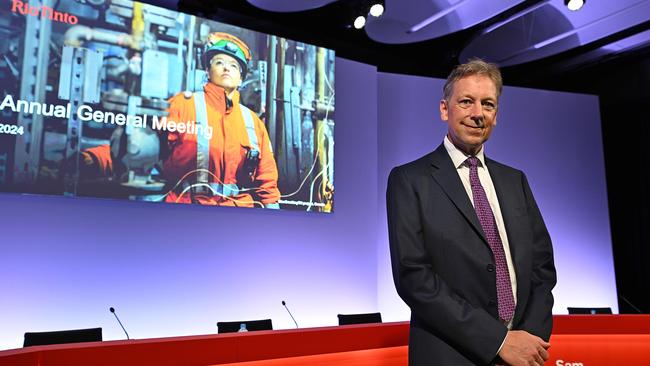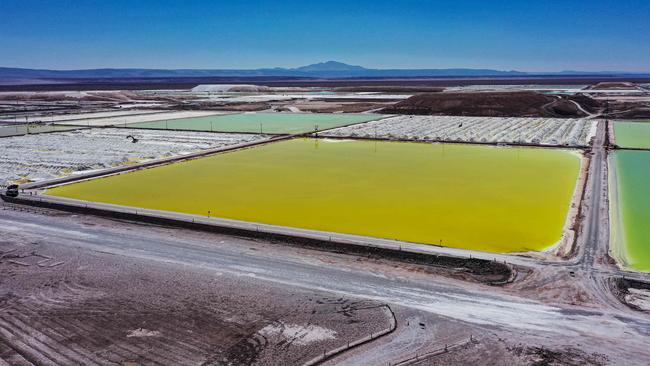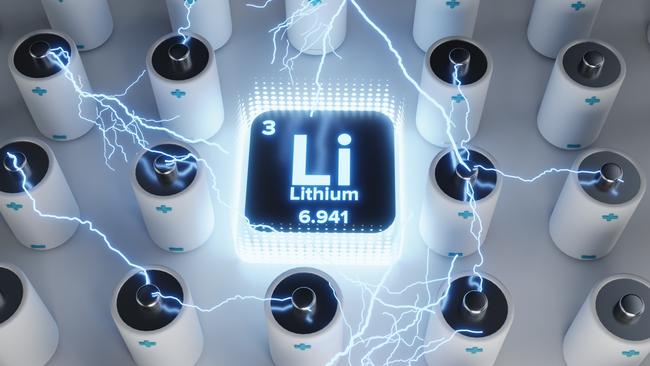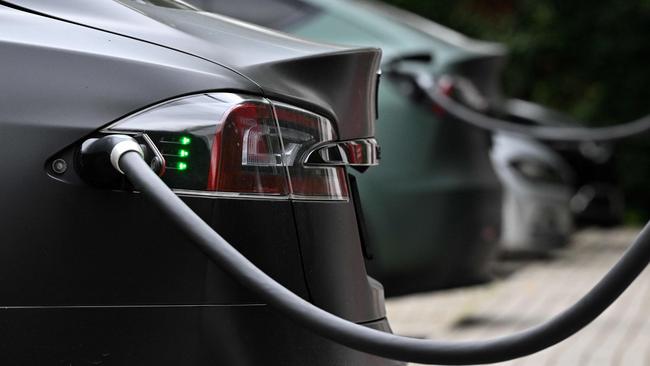Rio Tinto boss Jakob Stausholm has taken a sharp detour towards lithium
With all the focus on copper, the global miner is pivoting towards a metal which few of its rivals are taking seriously. This is why.

Business
Don't miss out on the headlines from Business. Followed categories will be added to My News.
With the world’s biggest miners in a race for anything resembling copper that’s not already pegged down, Rio Tinto boss Jakob Stausholm has taken a sharp detour towards lithium – a soft metal that many doubt will ever make it into the ranks as a top-tier commodity.
Although there’s still a long way to go, there are two things the Rio Tinto boss is signalling through his opportunistic $US4bn ($5.9bn)-plus approach for stretched lithium play Arcadium.
The first is a reminder that lithium is a multi-decade play and Stausholm calculates the long-term outlook for lithium prices is likely to be much higher than the stockmarket is currently anticipating.
The other is that Rio Tinto has got its mergers and acquisitions mojo back again.
Arcadium is the lithium sector’s top consolidator and, through his approach, the Rio boss has put a much-needed rocket under a seriously depressed sector.
Many players have been battling the downturn by shelving operations and conserving cash. The prices of lithium carbonate, used for industrial-strength batteries, have been hit by a major market oversupply and there’s been little prospect of recovery in the near term.

Sagging sales for electric vehicles outside China, as well as last week’s confirmation from Beijing that the economy could be in deeper trouble, have added to the bleak prospects for lithium.
Just last week Regal Funds boss Phil King said that no matter the value in prices, he wasn’t going near lithium. “(It) looks heavily oversupplied and we don’t think that’s going to turn around in the short term,” King said.
The Australian and US-listed Arcadium itself is a product of multiple big-bang lithium mergers.
But so much was tied up in the development of its lithium prospects and that couldn’t save its share price which was off more than 60 per cent before takeover talks emerged.
It was this year Australia’s Allkem merged with South American-focused Livent in a deal at the time valued at $US9.7bn. That came only two years after Allkem was formed by the merger of Australian lithium stars Galaxy Resources and Orocobre.
Prior to The Australian’s DataRoom column revealing talks were under way on the weekend, Arcadium was valued at a little over $US3bn.
Rio has made its approach at a time Arcadium has had the double hit of collapsed lithium prices and the fact that the lithium major will be in a heavy capex phase.
With less revenue coming in the door and more going out to pay for its Argentinian processing project and other manufacturing sites across North America and Canada, Arcadium is expected to be cashflow negative at least for the next four years.
But Arcadium has the ambition of being a fully integrated batteries-grade lithium producer ranking as one of the biggest in the world. It is planning to go right to the top of the value chain.
Still, as Citi analysts noted, it is cheaper to buy Arcadium than try to build an Arcadium from scratch (they estimate the replacement cost of the business is sitting at around $US8bn, highlighting the value gap).
That’s the purely opportunistic side for Rio’s approach. But a company like Rio plans in long-term cycles and Stausholm still believes lithium – like copper – will be a metal of the future.

He has previously told investors the reason why he has persisted with lithium is that the market fundamentals for battery-grade lithium carbonate are strong. He also likes the speed of development because lithium is able to be brought to market much quicker than hard-rock mines like copper.
Rio has previously tipped demand to grow at more than 25 per cent annually from the 2030s, although it concedes the market will be oversupplied until the second half of this decade. But it is only interested in options which have strategic value.
“It doesn’t really matter what the lithium price is for us in the short term,” Stausholm told a recent investor briefing. “We really have to think about what’s going to be the average price over the next 10, 15, 20 years.
“The world will need lithium because you do need lithium for at least high-performance batteries. And the world needs more batteries. So that’s, kind of, the fundamentals are going our way.”
Arcadium’s lithium brine-based operations of Salar del Hombre Muerto produces lithium carbonate at a facility on site. This complements Rio’s new Rincon project, which is also in Argentina’s so-called “lithium triangle” where it has been planning to build a battery-grade lithium carbonate plant. Early works are under way to build a 3000 tonne-per-annum battery-grade lithium carbonate starter plant.
And with the approach on Arcadium, Rio is defining itself against its rival big miners by being prepared to go much further downstream in its chosen markets.
Arcadium’s operations involve complex chemical processing to turn raw materials into battery-grade product, which in turn is sold directly to carmakers or battery giants across Asia and the US. Rio is one of the world’s key aluminium producers, which involves the mining of bauxite and manufacturing of alumina and aluminium.

Stausholm told investors that lithium is another leg to provide meaningful diversification.
“We supply almost any industrial player with aluminium, we are by far the biggest Western producer of aluminium and all those customers, automakers, they’re screaming us ‘Can’t you also sell us lithium?’ So our value proposition to customers is changing,” he said.
Arcadium has a number of high-end manufacturing facilities under construction across the US, Argentina and also Canada, including the Bessemer City in North Carolina, which is the only lithium metal producer in the US.
Rio says the approach made to Arcadium was non-binding and there was no certainty that any transaction would be agreed to or would proceed.
Critically, the on-market M&A is also a sign Stausholm thinks his miner has put the myriad of operational problems of the past behind him.
His Australian iron ore business is running well and making inroads on marginal costs; and Rio’s Mongolian copper business is ramping up nicely after Stausholm finally sorted out the messy ownership structure.
Importantly, Stausholm’s management team has been stable, a telling sign of the momentum the miner has found. The Juukan caves scandal had forced Rio to work on rebuilding its public image.
However, it’s no surprise that even today Rio is haunted by its Alcan aluminium mega-buyout nearly two decades ago, which still ranks among one of the worst M&A deals of this century. Rio paid top dollar for Alcan, which quickly collapsed in value as China started flooding the market with cheap metal. So too it loaded Rio up with heavy debts and forced it into a $US15bn rights issue.
Stausholm has done smaller purchases since taking charge, including the $US825m Rincon buyout from private funds, and the US$3.1bn of minorities in Canada’s Turquoise Hill to get cleaner ownership of the Oyu Tolgoi project in Mongolia. Both of these deals were executed cleanly and came without any nasty shocks.
At about $US5bn, Arcadium is a relatively modest deal for a miner the size of Rio, however there will still be a large degree of caution inside Rio about the transaction.
It is likely that a round of price discovery will follow but Rio will need to prove to its own shareholders it can hold the line on price.
Possible rival bidders will be few and far between as names like BHP have declared an intention to sit out of lithium. Glencore has little interest in the metal. This means Arcadium’s defence team will have their work cut out.
With a depressed near-term price and without the support of a bid there’s little on the horizon that could fire up the stock in the short term
In July, Stausholm said a line had been drawn under a decade where Rio Tinto simply didn’t grow.
The miner was now executing projects better and was seeing good organic growth in its business, he said at the time.
The Arcadium approach is a small step but shows a cashed-up Rio has got its confidence back and is ready to deal again.
Originally published as Rio Tinto boss Jakob Stausholm has taken a sharp detour towards lithium



